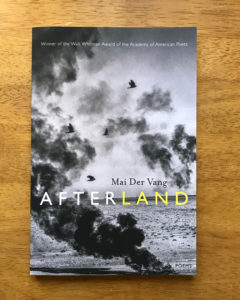
Winner of the 2016 Walt Whitman Award of the Academy of American Poets, Selected by Carolyn Forché
Longlisted for the 2017 National Book Awards in Poetry
Finalist for the 2018 Kate Tufts Discovery Award
Published by Graywolf Press
OVERVIEW
When I make the crossing, you must not be taken no matter what
the current gives. When we reach the camp,
there will be thousands like us.
If I make it onto the plane, you must follow me to the roads
and waiting pastures of America.
We will not ride the water today on the shoulders of buffalo
as we used to many years ago, nor will we forage
for the sweetest mangoes.
I am refugee. You are too. Cry, but do not weep.
—from “Transmigration”
Afterland is a powerful, essential collection of poetry that recounts with devastating detail the Hmong exodus from Laos and the fate of thousands of refugees seeking asylum. Mai Der Vang is telling the story of her own family, and by doing so, she also provides an essential history of the Hmong culture’s ongoing resilience in exile. Many of these poems are written in the voices of those fleeing unbearable violence after U.S. forces recruited Hmong fighters in Laos in the Secret War against communism, only to abandon them after that war went awry. That history is little known or understood, but the three hundred thousand Hmong now living in the United States are living proof of its aftermath. With poems of extraordinary force and grace, Afterland holds an original place in American poetry and lands with a sense of humanity saved, of outrage, of a deep tradition broken by war and ocean but still intact, remembered, and lived.
BLURBS
“Afterland has haunted me. I keep returning to read these poems aloud, hearing in them a language at once atavistic, contemporary, and profoundly spiritual. Mai Der Vang confronts the Secret War in Laos, the flight of the Hmong people, and their survival as refugees. That a poet could absorb and transform these experiences in a single generation—incising the page with the personal and collective utterances of both the living and the dead, in luminous imagery and a surprising diction that turns both cathedral and widow into verbs, offering both land and body as swidden (slashed and burned)—is nothing short of astonishing. Here is deep attention, prismatic intelligence, and fearless truth.”
—Carolyn Forché, Judge’s Statement for the Walt Whitman Award
“Each poem in Mai Der Vang’s Afterland hones a spiritual and social truth as she delivers the lament of her people—the Hmong—in this groundbreaking collection. The poet’s ancestors speak to us. But silence also belongs to these telling songs that expose us to the bare evidence of war. Afterland speaks to us now; her voice summons across borders, revealing the secrets of Laos that underscore today’s political circumstance: ‘I am refugee. You are too. Cry, but not weep. // We walk out the door.’ Vang’s poems are simultaneously imagistic and straightforward, and she’s not afraid of the magic that can happen when tradition converges with the experimental: ‘Every snowflake a small city // Falling on the eyelash.’ Afterland proves to us that there isn’t any shorthand for passion.”
—Yusef Komunyakaa
“With a ‘sliced and boiled tongue,’ the voice drifts in and out of the ‘ash oven of a forest,’ from the shrapneled spirit meals of a Laos gone, quaked by forced wars and continuous fading echoes of the lost, Mai Der, nocturnal soul-smith, returns to that war-riddled sub-land and leaves us these ‘dispatches.’ I am astounded at how this poet accomplishes these tellings of war, of the Hmong peoples, of escape, exile, of never-leaving, of always-returning—of retracing the life-particles of the dead in various forms of disappearance and presence. In a language of ‘torn jackets’ and fruit, of insects and mothers, of humpbacks and shamans, Mai Der Vang comes back at us as the ‘carved edge of a claw.’ The mastery of image, the leap, the dislodging of our perceptions, fluid as ‘humming of rain against a woman’s bare neck.’ A major, almost impossible, groundbreaking collection.”
—Juan Felipe Herrera
